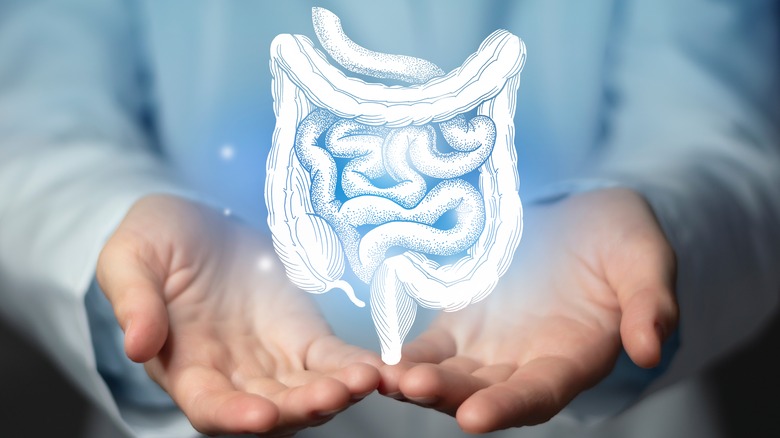What Happens To Your Body When You Have A Spastic Colon?
Spastic colon is a term that is often used to describe the condition known as irritable bowel syndrome (IBS). IBS is a disorder that impacts the large intestine and has a wide array of symptoms, including abdominal pain, gas, and diarrhea. While most cases of IBS aren't serious, the condition is chronic, and an afflicted person will have to learn how to manage its symptoms (via the Mayo Clinic).
According to the Mayo Clinic, the term "spastic colon" as a descriptor for IBS is derived from the erratic contracting of the muscles in the small and large intestines. Although IBS is the most common condition that leads to a spastic colon, it is not the only one. According to Mindset Health, a number of other conditions can lead to contractions in the colon, including ulcerative colitis, Crohn's disease, or bowel obstruction.
Whether related to IBS or as a result of another condition, symptoms of a spastic colon can be uncomfortable, sometimes painful, and even embarrassing. They can also have an impact on your life, particularly if you are stricken with symptoms while out in public. To better understand whether or not you may be experiencing spastic colon, it helps to understand what is happening when your colon spasms.
What makes your colon spasm?
When we eat, food travels from the mouth, down the esophagus, and into the stomach. The food is then broken down, and any material not absorbed by the body is expelled through the small and large intestines before ultimately being excreted (via the Digestive Healthcare Center). As we digest our food, the colon walls contract to keep everything moving smoothly. Ordinarily, you won't notice these contractions. However, if things are not working well, that's when you'll feel colon spasms (via MedicalNewsToday).
When a spasm occurs, the muscles that line the colon contract irregularly and often painfully. Unlike ordinary contractions, these are very noticeable (via Healthline). According to the Cleveland Clinic, when you have a colon spasm, you may feel a sudden cramping sensation in your lower abdomen, especially on the lower left side. Other symptoms can include a bloated stomach, constipation, or a sudden urge to go to the bathroom. These colon spasms can also push fecal matter forward, leading to incontinence.
In addition to these symptoms, you may notice mucus in your stool. Mucus is produced throughout the body to lubricate and protect the lining of various body parts, including the digestive tract. Nonetheless, there is no clear reason why gastrointestinal problems like IBS and Crohn's disease lead to mucus in the stool. If you are noticing it, in addition to other spastic colon symptoms, be sure to let your healthcare provider know.
How can you manage spastic colon symptoms?
Although a spastic colon can be an inconvenience, for the most part, the symptoms can be managed through a few basic lifestyle changes. These include reducing stress and getting more regular exercise (via PrimeHealth). In addition, certain foods can trigger IBS or spastic colon symptoms. Foods that are high in lactose, like milk, cream cheese, and sour cream, as well as fruits that are high in fructose, such as apples and pairs, are all potential triggers. Low fructose fruits like blueberries, strawberries, oranges, and lemons are a better option. You should also limit vegetables like broccoli, cauliflower, and sauerkraut in favor of celery, carrots, and squash (via the Cleveland Clinic).
If the symptoms persist, there are also medications you can try, such as fiber supplements, over-the-counter laxatives, or anti-diarrheal medications, like Imodium. If the symptoms are particularly severe, there are prescription medications you can try (via the Mayo Clinic). Before taking any medications for spastic colon symptoms, be sure to consult your healthcare professional.
A spastic colon can be disruptive to your lifestyle and make it feel as though you aren't in control of your own body. The solution lies in listening to what your body is telling you that it needs and what it's telling you that it can't tolerate. Consult with your doctor, get right with your body, limit stress, and improve your diet. Hopefully, your spastic colon will be able to enjoy a much-needed rest.



